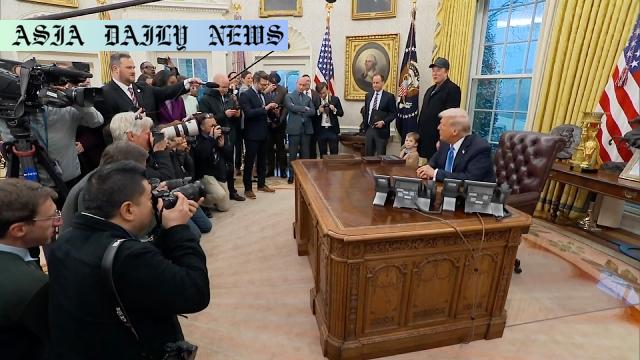Press Freedom: AP reporter barred from event over refusal to adopt new Gulf of Mexico name mandated by presidential order.
AP reporter barred from Oval Office event for using ‘Gulf of Mexico.’
White House issued mandate to use ‘Gulf of America’ instead.
Criticism erupted citing infringement on press freedom and First Amendment rights.

Introduction
In a controversial move that has reignited debates about press freedom in the United States, the White House barred an Associated Press (AP) reporter from attending an event in the Oval Office on Tuesday. The decision was reportedly in response to the AP’s refusal to adopt a presidential directive renaming the Gulf of Mexico to the Gulf of America, an order issued by President Donald Trump on the day of his inauguration. The act has triggered widespread criticism from media organizations and advocates of the First Amendment.
The Renaming Controversy
The issue stems from an executive order signed by President Trump on January 20, which officially renamed the Gulf of Mexico to the Gulf of America. While the order holds authority within the United States, it does not extend internationally. The Associated Press took a firm stance against the directive by stating that it would continue to use “Gulf of Mexico,” arguing that as a global news agency, it must utilize universally recognized place names to ensure consistency and clarity for its worldwide audience.
AP: Upholding Journalistic Independence
In its announcement, the AP made it clear that its decision was rooted in journalistic integrity and independence. A style guidance released by the AP on January 23 emphasized that adhering to such orders compromises the organization’s credibility and independence. “As a global news agency that disseminates news around the world, the AP must ensure that place names and geography are easily recognizable to all audiences,” the statement read.
Reactions from the Media Community
The White House’s decision has drawn condemnation from media organizations and First Amendment advocates. The White House Correspondents’ Association issued a statement urging the administration to reconsider its actions. “The White House cannot dictate how news organizations report the news,” the association stated, highlighting the importance of an independent press in a functioning democracy.
First Amendment Implications
Critics argue that the White House’s actions amount to an infringement on the freedoms guaranteed under the First Amendment of the U.S. Constitution, which includes the right to a free press. By barring the AP reporter over editorial decisions, the administration’s actions raise serious questions about government overreach and its impact on journalistic independence.
Setting a Troubling Precedent
This incident signifies more than just a renaming dispute; it sets a precedent that could have far-reaching implications for media freedom in the United States. By attempting to enforce its narrative through punitive measures, the administration risks eroding the very principles of transparency and accountability that the press is meant to uphold. If left unchallenged, such actions could embolden future administrations to impose similar restrictions on dissenting media.
Conclusion
The ongoing conflict between the Associated Press and the Trump administration underscores the critical role of an independent press. While the Gulf of Mexico renaming may seem inconsequential at first glance, the underlying principles at stake are far from trivial. Press freedom is a cornerstone of democracy, and any attempt to undermine it poses a threat to the liberties that citizens rely on. As the controversy unfolds, media organizations, advocacy groups, and the public must remain vigilant in defending the vital role of independent journalism in holding power to account.
Commentary
Press Freedom Under Threat
The recent decision by the White House to bar an AP reporter over the organization’s refusal to comply with a government directive raises fundamental questions about democracy and press freedom. The First Amendment safeguards the media from government interference, yet we see here an administration attempting to exert undue influence over editorial practices. This is not merely a dispute over geographic terminology; it is an alarming assault on journalistic independence.
The Danger of Setting a Precedent
This incident could have long-lasting consequences. By using access as a bargaining chip, the administration risks setting a dangerous precedent for future interactions between the government and the press. What is to stop future leaders from leveraging similar tactics to suppress unfavorable coverage? Allowing this behavior to go unchecked threatens the very fabric of free and independent journalism.
Why This Matters to the Public
Ultimately, the issue affects more than just journalists—it affects everyone. A free and independent press serves as a watchdog, holding power accountable and ensuring transparency. If the media is coerced into compliance through threats and restrictions, the flow of unbiased information to the public is at risk. This should concern every citizen, as an uninformed society is unable to make well-informed decisions.
A Call to Action
It is crucial for media organizations, civil rights groups, and the public to actively defend press freedom. The incident serves as a reminder that democracy thrives on transparency and accountability. We must resist any attempts to erode the rights and responsibilities of journalists, ensuring that the principles of freedom of speech and expression remain intact for generations to come.


